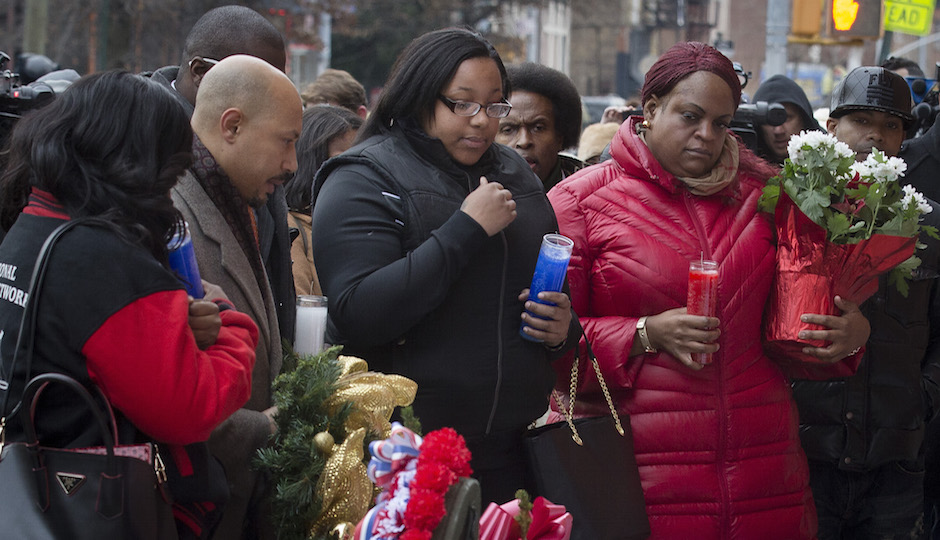The heinous slayings of two NYPD police officers, Wenjian Liu and Rafael Ramos, closes our year with a real heartbreaker. A lot of the reactions to the senseless killings were awful and partisan, with one stirring exception. A few notes:
- If Bill O’Reilly thinks Mayor de Blasio should resign from office for his tepid remarks about NYPD and race, for showing concern for his dark-skinned son, I wonder when the Fox personality will step down for cheerleading us into the Iraq War, which got 4,500 uniformed Americans killed and many more permanently injured for no reason.
- Rudy Giuliani, who was another of the most outspoken champions of rushing our soldiers to needless death in Iraq, believes that President Obama waged a “campaign of anti-police propaganda” for the very cautious remarks he has made about American racial divisions. What he is essentially doing is telling African-Americans that they have to shut up about the raw deal they’ve received in this country and that they continue to receive in mercifully less-awful ways. If you want to hear voices that were more puzzled about Garner’s killing than Obama’s, listen to conservatives like George W. Bush, Charles Krauthammer and John Boehner. They all thought there was something amiss. There was, of course.
- Giuliani worrying about someone else creating an aura of danger is laughable. When he was New York City’s Mayor, he sent in helicopters to break up an African-American youth march in Harlem the second it was legislated to end, just because some of the speakers were objectionable. When he put whirring blades above the heads of children out of spite, he showed how much concern he had for their lives.
- Bernie Kerik, the felon, was always a fake tough guy and phony law-and-order figure. No respectable news organization should be asking for his opinion on these matters.
- As long as we have two systems of policing and justice in America, we will have significant racial strife. Giuliani and the others can claim law enforcement has been color blind, but that’s just not the case. When you’re more likely to be harassed and arrested because of your skin color–and the statistics bear that out–we aren’t any safer, just more divided.
- Emerald Garner, whose father was choked to death for allegedly selling loose cigarettes and not immediately submitting to arrest, went to the murdered officers’ memorial, putting aside her own grief and laying a wreath in their honor. This may have been the most beautiful gesture of the year. Watching an act like hers, it’s tempting to think perhaps there’s hope for all of us, everyone.
From an analysis of the bigger picture of American law enforcement by Ta-Nehisi Coates of the Atlantic:
“The idea of ‘police reform’ obscures the task. Whatever one thinks of the past half-century of criminal-justice policy, it was not imposed on Americans by a repressive minority. The abuses that have followed from these policies—the sprawling carceral state, the random detention of black people, the torture of suspects—are, at the very least, byproducts of democratic will. Likely they are much more. It is often said that it is difficult to indict and convict police officers who abuse their power. It is comforting to think of these acquittals and non-indictments as contrary to American values. But it is just as likely that they reflect American values. The three most trusted institutions in America are the military, small business, and the police.
To challenge the police is to challenge the American people, and the problem with the police is not that they are fascist pigs but that we are majoritarian pigs. When the police are brutalized by people, we are outraged because we are brutalized. By the same turn, when the police brutalize people, we are forgiving because ultimately we are really just forgiving ourselves. Power, decoupled from responsibility, is what we seek. The manifestation of this desire is broad. Former Mayor Rudy Giuliani responded to the killing of Michael Brown by labeling it a ‘significant exception’ and wondering why weren’t talking about ‘black on black crime.’ Giuliani was not out on a limb. The charge of insufficient outrage over ‘black on black crime’ has been endorsed, at varying points, by everyone from the NAACP to Washington Post columnist Eugene Robinson to Giuliani’s archenemy Al Sharpton.
Implicit in this notion is that outrage over killings by the police should not be any greater than killings by ordinary criminals. But when it comes to outrage over killings of the police, the standard is different. Ismaaiyl Brinsley began his rampage by shooting his girlfriend—an act of both black-on-black crime and domestic violence. On Saturday, Officers Liu and Ramos were almost certainly joined in death by some tragic number of black people who were shot down by their neighbors in the street. The killings of Officers Liu and Ramos prompt national comment. The killings of black civilians do not. When it is convenient to award qualitative value to murder, we do so. When it isn’t, we do not. We are outraged by violence done to police, because it is violence done to all of us as a society. In the same measure, we look away from violence done by the police, because the police are not the true agents of the violence. We are.”
Tags: Ta-Nehisi Coates

